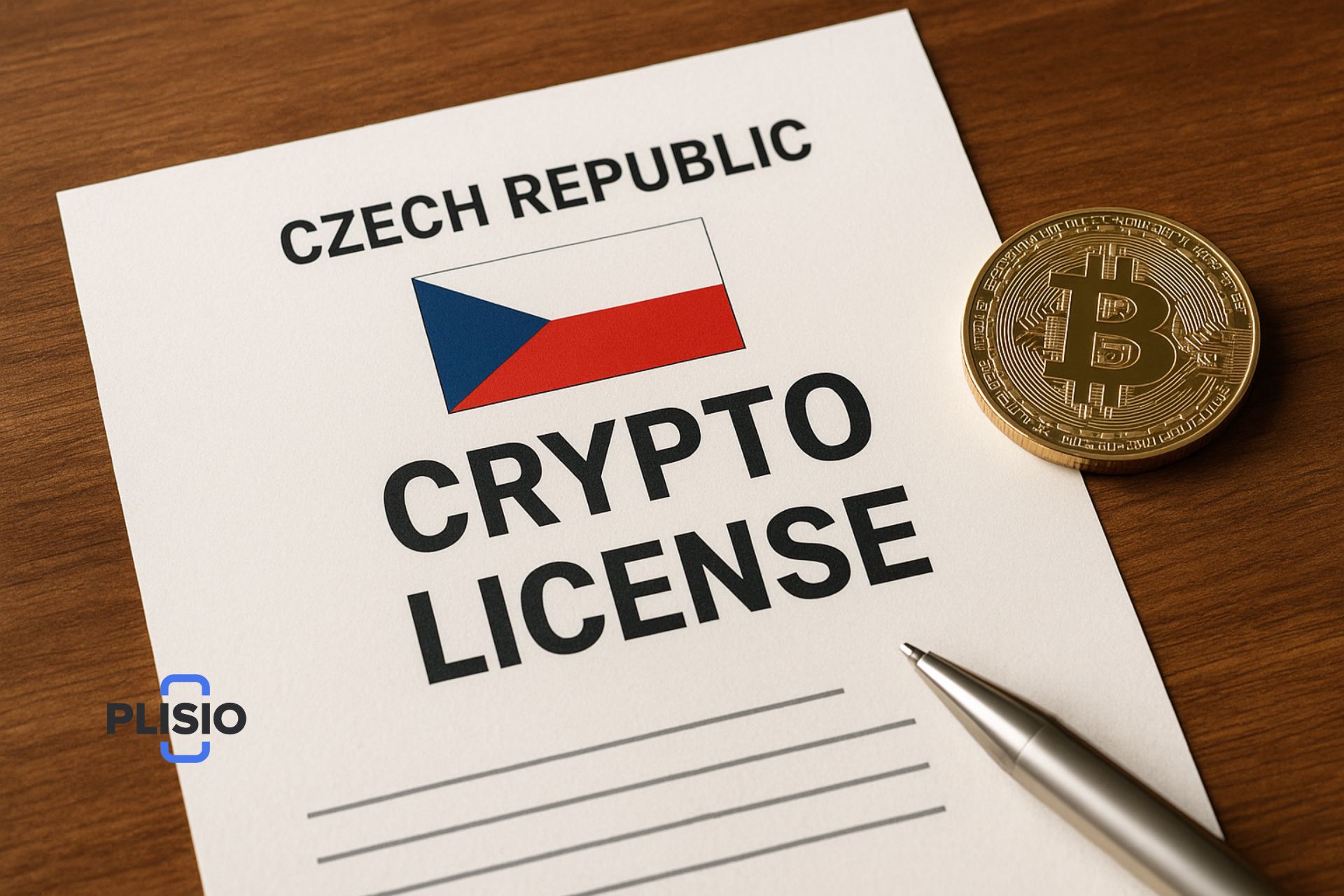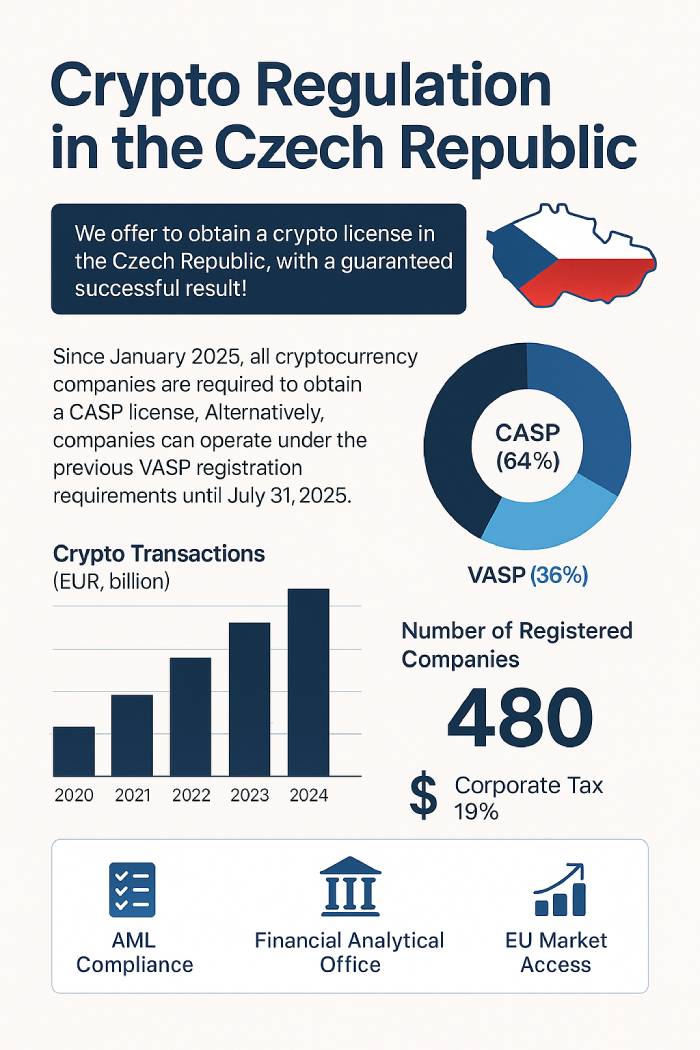Crypto Regulation in the Czech Republic: How to Obtain a Crypto License and Start a Crypto Business

The Czech Republic offers one of the most straightforward pathways in Europe for anyone looking to obtain a crypto license and launch a crypto business. The country’s regulatory landscape has evolved quickly, transforming Czech crypto regulation into a balanced system that protects users while allowing companies to innovate and grow. Today, both new and experienced crypto companies can register a company in the Czech Republic, enter the market, and operate legally under either traditional VASP rules or the updated MiCA‑compliant CASP license framework.
As of 2025, the Czech Republic is home to more than 52,000 registered cryptocurrency users, reflecting a year‑over‑year increase of nearly 18%. Crypto ownership in the country has reached 4.9% of the adult population, positioning the Czech Republic among the top ten EU countries in terms of digital asset adoption. The volume of cryptocurrency transactions in the Czech Republic grew by 22% in 2024, surpassing €3.1 billion in cumulative annual activity, according to data published by the Czech Statistical Office and EU fintech observatories.
On the business side, more than 1,200 Czech companies now operate in crypto‑related sectors, ranging from cryptocurrency exchanges and wallet providers to blockchain‑based service providers and tokenization startups. According to 2025 industry reports, approximately 38% of all new fintech registrations in the Czech Republic are related to virtual asset or blockchain technologies. This growth indicates increasing demand for clear licensing frameworks and reinforces the Czech Republic’s role as one of Central Europe’s fastest‑growing crypto hubs.
Since 2021, the Czech Trade Licensing Act has included a dedicated category Trade No. 81 covering services related to virtual assets. This addition marked the beginning of a structured approach to regulating cryptocurrency activities in the Czech Republic. Under Czech law, a virtual asset is any electronically stored value used for payment, exchange, or investment. Anyone providing crypto services professionally such as buying, selling, managing, or transferring digital assets must obtain a license in the Czech Republic by registering Trade 81 with the Czech trade licensing authorities.
While the Czech Republic offers a common European certificate for crypto‑related operations, it also distinguishes clearly between activities overseen by MiCA and those regulated solely under local Czech legislation. This makes it easier for crypto companies in the Czech Republic to determine which type of authorization best fits their business model.
CASP License in the Czech Republic: Crypto‑Asset Service Provider Licensing Process
Under MiCA, the CASP license becomes the main license required for cryptocurrency companies wishing to operate legally across the entire EU. MiCA sets a unified legal framework designed to increase transparency, prevent market abuse, and strengthen consumer protection. Crypto licenses issued under MiCA fall into three classes, each reflecting the nature and scale of crypto services offered. Capital requirements and compliance obligations are tied directly to the class of license a company applies for.
Class 1 CASP license – Basic Crypto Services
Includes:
- Execution of orders on behalf of clients
- Reception and transmission of orders
- Placing of crypto assets
- Providing crypto‑related advice
- Transfer services for crypto assets
- Portfolio management of crypto assets
Capital requirement: €50,000 (approx. 1,250,000 CZK)
Class 2 CASP license – Exchange & Custody Services
Adds:
- Custody and administration of crypto assets
- Cryptocurrency exchange services (crypto‑to‑fiat and crypto‑to‑crypto)
Capital requirement: €125,000 (approx. 3,125,000 CZK)
Class 3 CASP license – Trading Platform Operations
Includes all Class 1 and 2 activities plus:
- Operating a crypto trading platform
Capital requirement: €150,000 (approx. 3,750,000 CZK)
Beginning August 1, 2025, all cryptocurrency companies operating in the Czech Republic must hold a CASP license to continue offering services such as crypto exchange, custody, and crypto‑asset management.
VASP License in the Czech Republic: Local Cryptocurrency License Option
Before MiCA takes full effect, companies may still obtain a VASP license a more flexible authorization that is not subject to MiCA. A VASP license allows:
- P2P crypto trading
- NFT‑related business activities
- Opening corporate crypto exchange accounts
- Operating custodial or non‑custodial wallets
VASP‑licensed companies are supervised by the Financial Analytical Office (FAÚ), not the Czech National Bank. This makes the licensing process faster and requires fewer regulatory documents. All crypto companies with a VASP license must follow Czech AML rules, maintain internal policies, and appoint an AML officer.
Crypto companies operating under Czech VASP rules may work with both fiat currencies and cryptocurrencies, including EUR, USD, CZK, BTC, ETH, TON, and USDT. They may continue to operate under VASP authorization until July 31, 2025.
Crypto License in Czech Republic – Core Requirements for Company Registration
To start a crypto company in the Czech Republic, applicants must complete the following steps:
- Prepare corporate documentation and KYC policies
- Establish or purchase a limited liability company (s.r.o.)
- Contribute capital (up to €150,000 depending on license class)
- Obtain a CASP or VASP license through the relevant supervisory authority
- Comply with regulatory requirements, including Czech AML rules and EU standards
Oversight for cryptocurrency companies may come from the Financial Analytical Office (FAÚ) or the Czech National Bank, depending on the company’s crypto services.
The primary laws governing the sector include:
- Act No. 253/2008 Coll. (Czech AML Act)
- MiCA Regulation
- DORA Directive
These regulations ensure that cryptocurrency transactions in the Czech Republic comply with Czech and EU standards.
CASP License Application in the Czech Republic: Full Cryptocurrency License Guide
The Czech Republic offers a favorable environment for obtaining a CASP license in the Czech. All existing VASP‑licensed cryptocurrency companies must apply for a CASP license by July 31, 2025, to continue operations until July 1, 2026. Starting in August 2025, all new crypto startups must apply directly under MiCA.
To obtain a CASP license in the Czech Republic, a company must:
- Be incorporated in the Czech Republic as a limited liability company
- Meet the required capital threshold
- Maintain an office address in the Czech Republic
- Appoint a Czech‑resident director and a resident AML officer
- Prepare a complete package of compliance documentation
The licensing process typically takes 6–8 months. The Czech National Bank carefully reviews each license application and may request additional information before approval.
Crypto Regulation and Virtual Asset Rules in the Czech Republic
Cryptocurrency in the Czech Republic is legally treated as a commodity. This means crypto activities are not classified as financial services under Czech law, allowing crypto businesses to obtain a license quickly and at low cost. Many cryptocurrency companies in the Czech Republic choose this jurisdiction thanks to its simple licensing process, light regulatory burden, and low capital requirements.

Crypto Activities in the Czech Republic Covered by Cryptocurrency License
Once registered as a virtual asset service provider, a company may offer services such as:
- Buying and selling crypto assets
- Operating a cryptocurrency exchange
- Managing or storing crypto assets for client
- Generating private keys
- Facilitating crypto‑to‑crypto and crypto‑to‑fiat transactions
Companies engaged only in mining or accepting cryptocurrency as payment do not require a license.
Benefits of Obtaining a Crypto License in the Czech Republic
The Czech Republic is one of the most attractive jurisdictions for launching crypto operations due to:
- Fast company registration (1–2 weeks)
- No minimum capital for basic VASP registration
- No requirement for local directors under VASP rules
- Predictable and clear licensing process
- Competitive corporate tax rate (19%)
- Low startup and maintenance costs
These advantages make the Czech Republic a preferred destination for cryptocurrency companies entering the EU market.
Company Registration and Licensing Process for Crypto Businesses in the Czech Republic
The procedure for obtaining a crypto license is simple and includes:
- Register a company in the Czech Republic
- File for Trade 81 at the Trade Licensing Office
- Submit AML policies Appoint an AML officer
- Pay administrative fees
The licensing process usually takes 2–4 weeks under VASP rules.
Regulatory Requirements and Compliance Obligations for Czech Crypto Companies
Companies operating in the Czech Republic must:
- Perform KYC on clients above EUR 1,000
- Apply enhanced due diligence above EUR 15,000
- Monitor and report suspicious transactions to FAÚ
- Ensure GDPR compliance
Czech Tax Rules for Cryptocurrency Companies and Crypto Transactions
Czech tax authorities treat crypto income as standard business income. The corporate tax rate is 19%, and individuals pay 15% tax on personal cryptocurrency gains. Cryptocurrency exchange services are VAT‑exempt.
Impact of MiCA on Crypto Regulation in the Czech Republic
MiCA brings:
- A single licensing regime across the EU
- Stricter rules for issuers of stablecoins
- Clearer transparency requirements Increased investor protection
The Czech National Bank will supervise CASP‑licensed companies, ensuring compliance with Czech and EU regulations.
Buying a Company with a Crypto License in the Czech Republic
Entrepreneurs may purchase a company with a crypto license to accelerate market entry. Benefits include:
- Full AML compliance already in place
- No need for local staff
- Prices starting from €5,000
Key Czech Legal Acts Related to Cryptocurrency License and Crypto Regulation
Anyone starting a crypto business in the Czech Republic should study:
- The Czech Trade Licensing Act
- The Czech AML Act The Banking and Payment Systems
- Acts Investment Funds legislation
Recent 2025 Changes in Crypto Regulation in the Czech Republic
Beginning January 1, 2025, the Czech Republic’s crypto regulation shifted to align more closely with MiCA. All cryptocurrency companies must obtain a CASP license unless they choose the temporary VASP alternative available until July 31, 2025.
Historically, company incorporation in the Czech Republic required minimal capital and no corporate bank account. Crypto licensing could be completed within three weeks. Even without CNB supervision, Czech crypto companies remained obligated entities under the Czech AML Act.
Alternative Crypto License Option (VASP) in the Czech Republic Until July 31, 2025
A ready‑made crypto company with VASP registration offers:
- Fixed price of €12,000
- Approximate completion within 9 weeks
Czech Republic’s Preparedness for MiCA Regulation and CASP Licensing
Economic Advantages of Starting a Crypto Business in the Czech Republic (Expanded)
The Czech Republic is one of the most cost‑efficient EU jurisdictions for launching a crypto business. Compared to Lithuania and Estonia where initial licensing and compliance packages often exceed €25,000–€40,000 the Czech Republic remains significantly more affordable. Incorporation costs stay below €7,000, and annual maintenance is among the lowest in Europe.
When compared to Poland and Germany, where obtaining a cryptocurrency license can take 12–18 months, the Czech licensing process remains much faster, with VASP registration issued in 2–4 weeks and CASP authorization within 6–8 months.
Between 2022 and 2025, the Czech Republic saw a 31% increase in registered fintech and blockchain businesses surpassing regional competitors such as Slovakia and Hungary. This momentum reflects strong demand for an accessible regulatory environment and solidifies the Czech Republic as a rising European crypto hub.
Czech Crypto Ecosystem and Infrastructure (Expanded)
By 2025, the Czech Republic hosts one of the densest cryptocurrency infrastructures in Central Europe:
- Over 185 Bitcoin ATMs, ranking among the top‑10 EU countries.
- More than 1,200 active crypto businesses, including exchanges, wallet providers, tokenization platforms, and blockchain developers.
- Growing government‑supported initiatives such as Blockchain Connect / Czech Alliance.
- Educational and innovation support from Czech Technical University (CTU) and StartupYard, helping crypto startups develop and test blockchain solutions.
Prague remains a recognized European crypto hotspot home to Paralelní Polis, one of the world’s first crypto‑only cultural centers.
Detailed Overview of MiCA Requirements for CASP Licensing
MiCA introduces strict obligations for crypto‑asset service providers operating in the EU. Czech companies applying for a CASP license must demonstrate:
- Robust IT security, including penetration testing and compliance with DORA cybersecurity standards.
- Clear policies for client fund segregation, custody procedures, and private‑key management.
- Mandatory Travel Rule compliance, requiring data exchange for crypto transfers.
- Detailed risk management frameworks, covering liquidity, operational, market, and technology risks.
- Documented internal controls, including governance structures, internal audits, and conflict‑of‑interest rules.
MiCA’s passporting rules allow a Czech‑licensed CASP to operate freely across all 27 EU member states, making the Czech Republic a strategic launchpad for crypto expansion throughout Europe.
Banking and Corporate Account Services in the Czech Republic
Access to crypto‑friendly banking is a key factor for licensing success. In 2025:
- Around 20–25% of Czech banks accept crypto‑related companies.
- Banks such as Fio Banka and Raiffeisenbank have started working with CASP-prepared companies.
- Czech banks require strengthened KYC/KYT procedures and ongoing monitoring of cryptocurrency transactions.
Opening a corporate bank account usually takes 3–6 weeks, depending on the company’s business model and AML documentation.
Business Models Supported by Crypto Licensing in the Czech Republic
Companies with a VASP or CASP license may operate a wide range of regulated crypto activities, including:
- Cryptocurrency exchange platforms (spot or OTC)
- Crypto brokerage firms providing fiat‑to‑crypto services
- Tokenization platforms for real‑world assets, securities, or commodities
- Web3 payment solutions for e‑commerce and SaaS
- Custodial and non‑custodial wallet providers
- Asset management and crypto‑fund operators
Each business model corresponds to a specific license class under MiCA, ensuring transparency and predictable oversight.
Comparison Table: CASP vs VASP License
A clear comparison of the two main licensing options in the Czech Republic:
CASP License (MiCA)
- EU‑wide passporting
- Capital requirements: €50,000–€150,000
- Supervising authority: Czech National Bank
- Suitable for exchanges, custodians, and trading platforms
- High documentation and compliance requirements
VASP License (Local Law)
- Valid only in the Czech Republic
- No minimum capital requirement
- Supervising authority: FAÚ
- Suitable for P2P, NFT, basic crypto services
- Faster and simpler licensing process
Updated 2025 Market Statistics
The Czech crypto industry continues to expand rapidly:
- Crypto transaction volume exceeded €3.1 billion in 2024, with projections of €3.8 billion for 2025.
- The number of active users expected to surpass 60,000 by the end of 2025.
- Over 38% of all fintech startups registered in 2025 are based on virtual asset technologies.
- Czech cryptocurrency exchanges processed more than €900 million in 2024.
These numbers highlight expanding market demand and increasing investment in Czech crypto infrastructure.
Risks, Challenges, and Compliance Considerations for Crypto Companies
While the Czech Republic is business‑friendly, crypto companies must understand key risks:
- FAÚ has increased AML inspections by 19% since 2023.
- Fines for non‑compliance can exceed €400,000.
- CNB requires strict ICT controls under MiCA and DORA.
- Incomplete documentation is the #1 reason for license application delays.
Strengthening internal AML/KYC procedures and ensuring staff expertise are essential for maintaining compliance.
Real‑World Case Study: How a Crypto Startup Obtained a Czech VASP License
In 2024, a European fintech startup entered the Czech market to launch a cross‑border crypto exchange. With no local staff and limited capital, the team:
- Registered a Czech s.r.o.
- Implemented full AML/KYC policies.
- Appointed a remote AML officer.
- Completed VASP registration in just 17 days.
- Onboarded more than 2,500 users within three months.
This case illustrates how the Czech Republic’s streamlined licensing framework supports rapid market entry for crypto entrepreneurs.
In 2024, the Czech Republic confirmed its readiness for MiCA during parliamentary discussions. MiCA opens significant opportunities for Czech crypto companies, granting access to the unified European crypto market and ensuring higher transparency and investor confidence.
The country’s alignment with EU standards strengthens its position as one of the leading hubs for cryptocurrency activities in the region.




